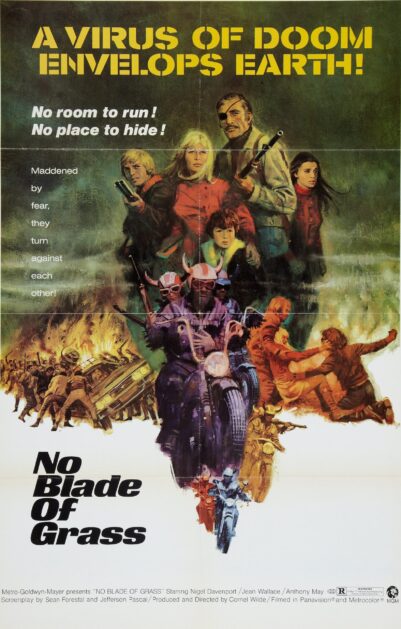 Like Mel Gibson after him, the late Cornel Wilde (1912-1989) was a Hollywood matinee idol turned director who had an obsession with violence. That was evident in Wilde’s first film as director, THE NAKED PREY (1965), an African-set exercise in minimalistic brutality (of which Gibson’s APOCALYPTO was an uncredited remake), and also his second, BEACH RED (1967), which set new standards for wartime carnage. For 1970’s NO BLADE OF GRASS, Wilde’s last noteworthy directorial effort (it was followed by the imminently forgettable SHARKS’ TREASURE in 1975), he adapted THE DEATH OF GRASS, a 1956 novel by John Christopher (a.k.a. Samuel Youd) about the breakdown of civilization (thus bringing up yet another actor-director: Ray Milland, whose PANIC IN YEAR ZERO served as a dry run for this film), and set it in Christopher’s native England.
Like Mel Gibson after him, the late Cornel Wilde (1912-1989) was a Hollywood matinee idol turned director who had an obsession with violence. That was evident in Wilde’s first film as director, THE NAKED PREY (1965), an African-set exercise in minimalistic brutality (of which Gibson’s APOCALYPTO was an uncredited remake), and also his second, BEACH RED (1967), which set new standards for wartime carnage. For 1970’s NO BLADE OF GRASS, Wilde’s last noteworthy directorial effort (it was followed by the imminently forgettable SHARKS’ TREASURE in 1975), he adapted THE DEATH OF GRASS, a 1956 novel by John Christopher (a.k.a. Samuel Youd) about the breakdown of civilization (thus bringing up yet another actor-director: Ray Milland, whose PANIC IN YEAR ZERO served as a dry run for this film), and set it in Christopher’s native England.
In the near future it seems that, according to narration by Wilde (who doesn’t appear but makes certain his voice is heard), “one day the polluted Earth could take no more.” A “grass disease” has caused much of Asia’s grassland to become inedible by animals (in the Christopher novel the title was literal, with all the grass dying and turning brown, but Wilde evidently lacked the budget to adequately depict that), leading to mass starvation. In London, where the virus has spread, chaos grips the populace and martial law is about to be declared. A day before the lockdown is decreed John Custance (Nigel Davenport), a WWII veteran turned pacifistic Londoner, decides to relocate his family, whose ranks include his wife Ann (Jean Wallace, a.k.a. Mrs. Cornel Wilde) and teen daughter Mary (Lynne Frederick), to a rural farm owned by his brother David (Patrick Holt).
This entails a drive out of the city in three packed cars. John adapts to this new cutthroat reality with unsettling acumen, committing murder after murder in order to stay alive. Along the way he picks up the trigger-happy punk Pirrie (Anthony May) and his slutty wife (Wendy Richard), who add an extra element of danger to an already perilous quest.
After some gun-wielding suburbanites steal their cars John and co. are forced to continue their journey on foot through the English countryside, where they gather together a ragtag micro army, and confront a renegade military detachment and a homicidal biker gang. Eventually they reach their destination, but are in for a shock when they find that David is none too keen on letting the group onto his land.
Overall this is a clumsy and ham-fisted film that’s nonetheless quite captivating, due mainly to the inherent power of the source novel. John Christopher’s deeply alarming depiction of a societal breakdown fully registers despite Wilde’s lackluster staging and jumbled editing (which makes it difficult to discern precisely what happens in the final scenes).
It certainly doesn’t help matters that Wilde adds an unruly assortment of flashbacks and, in an apparent nod to the psychedelic gist of the time, flash-forwards depicted via flashing color overlays. Further period annoyances include negatively exposed imagery, a supremely grating “hip” score by Burnell Whibley and copious environmental montages (depicting smokestacks, exhaust pipes, sewage dumped into rivers, dead fish and birds, etc.) to drive home the film’s ecological concerns.
One unquestionably positive element is the cast of skilled British thespians, dominated by a commanding turn by Nigel Davenport and a devious one by Anthony May. Their skills don’t overcome the poor filmmaking, but do at least render it bearable.
Vital Statistics
NO BLADE OF GRASS
Metro Goldwyn Mayer
Director/Producer: Cornel Wilde
Screenplay: Sean Forestal, “Jefferson Pascal” (Cornel Wilde)
(Based on a novel by John Christopher)
Cinematography: H.A.R. Thomson
Editing: Eric Boyd-Perkins, Frank Clarke
Cast: Nigel Davenport, Jean Wallace, Anthony May, John Hamill, Lynne Frederick, Patrick Holt, Anthony Sharp, Wendy Richard, Max Hartnell, John Lewis, Michael Percival, Mervyn Patrick, Denise Mockler, Ross Allan, Karen Terry, Joan Ward, Brian Crabtree, Susan Sydney, Michael Landy
